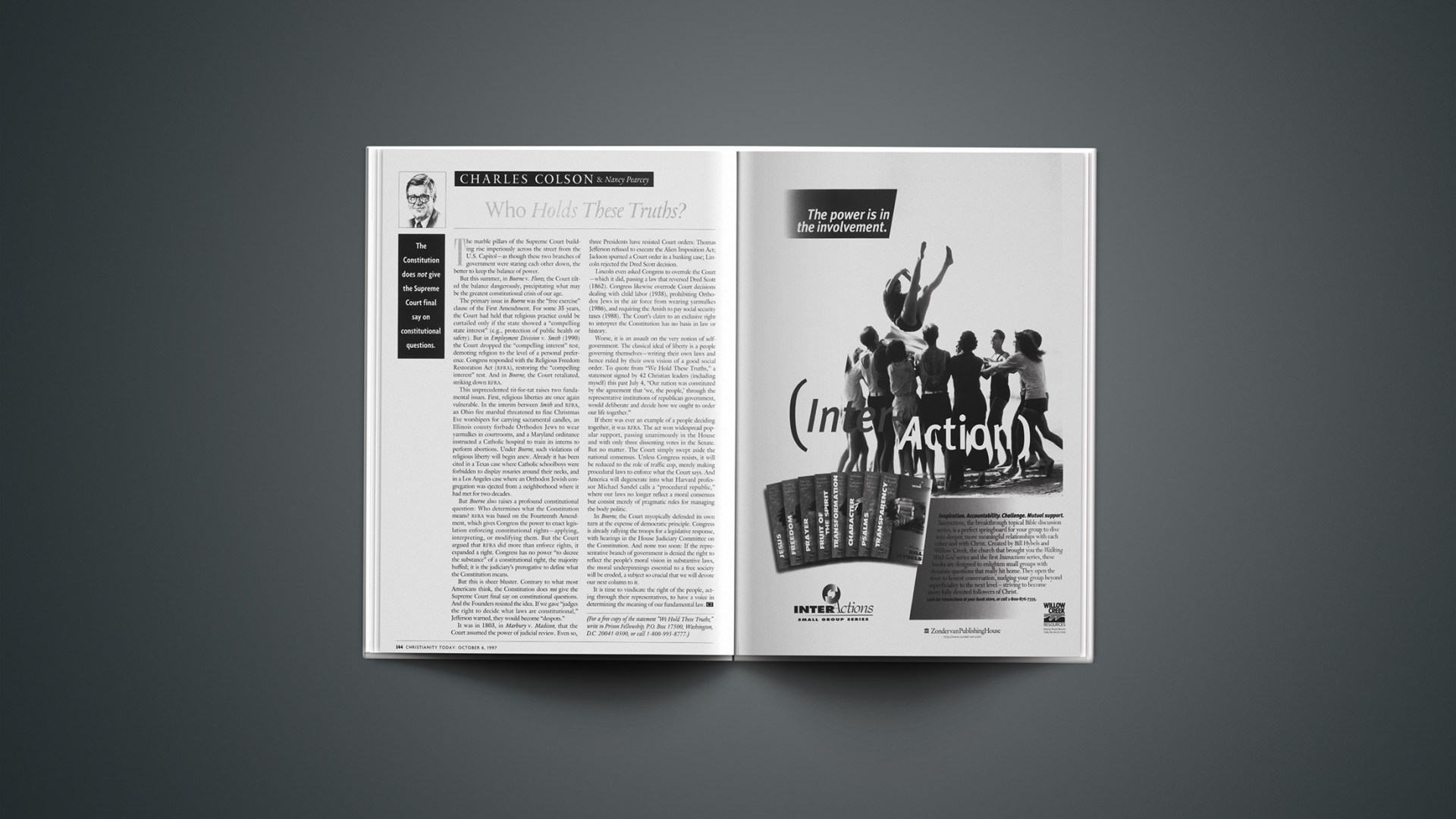The marble pillars of the Supreme Court building rise imperiously across the street from the U.S. Capitol—as though these two branches of government were staring each other down, the better to keep the balance of power.
But this summer, in Boerne v. Flores, the Court tilted the balance dangerously, precipitating what may be the greatest constitutional crisis of our age.
The primary issue in Boerne was the “free exercise” clause of the First Amendment. For some 35 years, the Court had held that religious practice could be curtailed only if the state showed a “compelling state interest” (e.g., protection of public health or safety). But in Employment Division v. Smith (1990) the Court dropped the “compelling interest” test, demoting religion to the level of a personal preference. Congress responded with the Religious Freedom Restoration Act (RFRA), restoring the “compelling interest” test. And in Boerne, the Court retaliated, striking down RFRA.
This unprecedented tit-for-tat raises two fundamental issues. First, religious liberties are once again vulnerable. In the interim between Smith and RFRA, an Ohio fire marshal threatened to fine Christmas Eve worshipers for carrying sacramental candles, an Illinois county forbade Orthodox Jews to wear yarmulkes in courtrooms, and a Maryland ordinance instructed a Catholic hospital to train its interns to perform abortions. Under Boerne, such violations of religious liberty will begin anew. Already it has been cited in a Texas case where Catholic schoolboys were forbidden to display rosaries around their necks, and in a Los Angeles case where an Orthodox Jewish congregation was ejected from a neighborhood where it had met for two decades.
But Boerne also raises a profound constitutional question: Who determines what the Constitution means? RFRA was based on the Fourteenth Amendment, which gives Congress the power to enact legislation enforcing constitutional rights—applying, interpreting, or modifying them. But the Court argued that RFRA did more than enforce rights, it expanded a right. Congress has no power “to decree the substance” of a constitutional right, the majority huffed; it is the judiciary’s prerogative to define what the Constitution means.
But this is sheer bluster. Contrary to what most Americans think, the Constitution does not give the Supreme Court final say on constitutional questions. And the Founders resisted the idea. If we gave “judges the right to decide what laws are constitutional,” Jefferson warned, they would become “despots.”
It was in 1803, in Marbury v. Madison, that the Court assumed the power of judicial review. Even so, three Presidents have resisted Court orders: Thomas Jefferson refused to execute the Alien Imposition Act; Jackson spurned a Court order in a banking case; Lincoln rejected the Dred Scott decision.
Lincoln even asked Congress to overrule the Court —which it did, passing a law that reversed Dred Scott (1862). Congress likewise overrode Court decisions dealing with child labor (1938), prohibiting Orthodox Jews in the air force from wearing yarmulkes (1986), and requiring the Amish to pay social security taxes (1988). The Court’s claim to an exclusive right to interpret the Constitution has no basis in law or history.
Worse, it is an assault on the very notion of self-government. The classical ideal of liberty is a people governing themselves—writing their own laws and hence ruled by their own vision of a good social order. To quote from “We Hold These Truths,” a statement signed by 42 Christian leaders (including myself) this past July 4, “Our nation was constituted by the agreement that ‘we, the people,’ through the representative institutions of republican government, would deliberate and decide how we ought to order our life together.”
If there was ever an example of a people deciding together, it was RFRA. The act won widespread popular support, passing unanimously in the House and with only three dissenting votes in the Senate. But no matter. The Court simply swept aside the national consensus. Unless Congress resists, it will be reduced to the role of traffic cop, merely making procedural laws to enforce what the Court says. And America will degenerate into what Harvard professor Michael Sandel calls a “procedural republic,” where our laws no longer reflect a moral consensus but consist merely of pragmatic rules for managing the body politic.
In Boerne, the Court myopically defended its own turn at the expense of democratic principle. Congress is already rallying the troops for a legislative response, with hearings in the House Judiciary Committee on the Constitution. And none too soon: If the representative branch of government is denied the right to reflect the people’s moral vision in substantive laws, the moral underpinnings essential to a free society will be eroded, a subject so crucial that we will devote our next column to it.
It is time to vindicate the right of the people, acting through their representatives, to have a voice in determining the meaning of our fundamental law.
(For a free copy of the statement “We Hold These Truths,” write to Prison Fellowship, P.O. Box 17500, Washington, D.C. 20041-0500, or call 1-800-995-8777.)
Copyright © 1997 Christianity Today. Click for reprint information.










